- Home
- H. Rider Haggard
Dawn Page 9
Dawn Read online
Page 9
CHAPTER IX
Poor Hilda found life in her London lodging anything but cheerful, andfrequently begged Philip to allow her to settle somewhere in thecountry. This, however, he refused to do on two grounds: in the firstplace, because few country villages would be so convenient for him toget at as London; and in the second, because he declared that thegreat city was the safest hiding-place in the world.
And so Hilda continued perforce to live her lonesome existence, thatwas only cheered by her husband's short and uncertain visits. Friendsshe had none, nor did she dare to make any. The only person whoseconversation she could rely on to relieve the tedium of the long weekswas her landlady, Mrs. Jacobs, the widow of a cheesemonger, who hadruined a fine business by his drinking and other vicious propensities,and out of a good property had only left his wife the leasehold of ahouse in Lincoln's Inn Fields, which, fortunately for her, had beensettled upon her at her marriage. Like most people who have seenbetter days--not but what she was now very comfortably off--shedelighted in talking of her misfortunes, and of the perfidiousness ofman; and in Hilda, who had, poor girl, nothing else to listen to, shefound a most attentive audience. As was only natural where such acharming person and such a good listener were concerned, honest Mrs.Jacobs soon grew fond of her interesting lodger, about whose husband'scircumstances and history she soon wove many an imaginary tale; for,needless to say, her most pertinent inquiries failed to extract muchinformation from Hilda. One of her favourite fictions was that herlodger was the victim of her handsome husband, who had in some waybeguiled her from her home beyond the seas, in order to keep her insolitary confinement and out of the reach of a hated rival. Another,that he kept her thus that he might have greater liberty for his ownactions.
In course of time these ideas took such possession of her mind thatshe grew to believe in them, and, when speaking of Hilda to any of herother lodgers, would shake her head and talk of her mysteriously as a"lamb" and a "victim."
As for that lady herself, whilst far from suspecting her goodlandlady's gloomy surmises, she certainly fell more and more a prey todepression and anxieties, and occasionally even to suspicion, to allof which evils she grew increasingly liable as she drew nearer to anevent that was no longer very distant. She could not but notice achange in Philip's manner on the rare occasions when he was able tovisit her, of which the most marked developments were fits of silenceand irritability. A certain reticence also, that became more and morenoticeable as time went on, led her to feel that there was aninvisible something growing up between them--a something that thepride she possessed in such a striking degree forbade her to attemptto pierce, but which was none the less galling to her on that account.Very shortly before the events narrated in the last chapter she hadtaken the occasion of a visit from Philip to complain somewhatbitterly of her position, begging him to tell her when there was anyprospect of her being allowed to take her rightful place--a questionher husband was quite unable to answer satisfactorily. Seeing thatthere was nothing to be got out of him, with womanly tact she changedthe subject, and asked after Maria Lee (for whom she entertained agenuine affection)--when he last saw her, how she was looking, ifthere was any prospect of her getting married, and other questions ofthe same sort--the result of which was to evoke a most violent, and toher inexplicable, fit of irritability on the part of her husband.Something of a scene ensued, which was finally terminated about fiveo'clock in the afternoon by Philip's abrupt departure to catch histrain.
Shortly afterwards Mrs. Jacobs, coming up to bring some tea, foundHilda indulging in tears that she had been too proud to shed beforeher husband; and, having had an extended personal experience of suchmatters, rightly guessed that there had been a conjugal tiff, theblame of which, needless to say, she fixed upon the departed Philip.
"Lor, Mrs. Roberts" (as Hilda was called), she said, "don't take onlike that; they're all brutes, that's what they are; if only you couldhave seen my Samuel, who's dead and gone these ten years and buried ina private grave at Kensal Cemetery--though he didn't leave anything topay for it except three dozen and five of brandy--he was a beauty,poor dear, he was; your husband ain't nothing to him."
"My husband, let me tell you, Mrs. Jacobs, is not a brute at all,"sobbed Hilda, with dignity.
"Ah, Mrs. Roberts, that is just what I used to say of Samuel, but hewas the biggest brute in the three kingdoms, for all that; but if youask me, meaning no offence, I call a man a brute as only comes to seehis lawful wife about twice a month, let alone making an angel cry."
"Mr. Roberts has his reasons, Mrs. Jacobs; you must not talk of himlike that."
"Ah, so my Samuel used to say when he stopped away from home for threenights at a time, till I followed him and found out his 'Reason,' anda mighty pretty 'Reason' she was too, all paint and feathers, thehussy, and eyes as big as a teacup. They all have their reasons, butthey never tell 'em. But come and put on your things and go out a bit,there's a dear; it is a beautiful warm evening. You feel tired--oh,never mind that; it is necessary for people as is in an interested wayto take exercise. I well remembers----"
Here Hilda, however, cut the subject short, and deprived herself ofMrs. Jacobs' reminiscences by going to put on her things.
It was a bright warm evening, and she found the air so pleasant that,after strolling round Lincoln's Inn Fields, she thought she wouldextend her walk a little, and struck past Lincoln's Inn Hall into NewSquare, and then made her way to the archway opposite to where the NewLaw Courts now stand. Under this archway a legal bookseller has builthis nest, and behind windows of broad plate-glass were rangedspecimens of his seductive wares, baits on which to catch studentsavaricious of legal knowledge as they pass on their way to chambers orHall. Now, at this window a young man was standing at the moment thatHilda entered the archway, his eyes fixed upon a pamphlet on the lawsof succession. That young man was George Caresfoot, who wasconsidering whether it would be worth his while to buy the pamphlet inorder to see if he would be entitled to anything if his uncle shouldhappen to die intestate, as he sometimes feared might be the case. Hehad come up to town on business connected with his firm, and was nowwaiting till it was time to begin an evening of what he understood aspleasure; for George was a very gay young man.
He was, however, also a very sharp one, so sharp that he even noticedshadows, especially when, as in this case, the shadow was clearlydefined and flung, life-sized, on the dark background of the booksbefore him. He watched it for a moment, and as its owner, with anabsent air, slowly passed from the bright sunlight into the shade ofthe arch, it struck the astute George that there was somethingfamiliar about this particular and by no means unpleasing shadow.Waiting till it had vanished and the footsteps gone past him, heturned round and at a glance recognized Hilda von Holtzhausen, MissLee's beautiful companion, who was supposed to have departed into themore distant parts of Germany. George's eyes twinkled, and a wholehost of ideas rushed into his really able mind.
"Caught at last, for a sovereign," he muttered.
Meanwhile Hilda walked slowly on into Chancery Lane, then turned tothe left till she came into Holborn, and thence made her way round byanother route back to Lincoln's Inn Fields. Needless to say, Georgefollowed at a respectful distance. His first impulse had been to go upand speak to her, but he resisted the inclination.
On the doorstep of the house where Hilda lodged, stood her landladygiving a piece of her mind to a butcher-boy both as regarded hismaster's meat and his personal qualities. She paused for breath justas Hilda passed up the steps, and, turning, said something that madethe latter laugh. The butcher-boy took the opportunity of beating arapid retreat, leaving Mrs. Jacobs crowing after him from her owndoorstep. As soon as Hilda had gone into the house, George saw hisopportunity. Advancing politely towards Mrs. Jacobs, he asked her ifshe was the landlady of the house, and, when she had answered in theaffirmative, he made inquiries about apartments.
"Thank you, sir," said Mrs. Jacobs, "but I do not let rooms to singlegentlemen."
"You take too much for granted, ma'am. I am married."
She looked at him doubtfully. "I suppose, sir, you would have noobjection to giving a reference."
"A dozen, if you like, ma'am; but shall we look at the rooms?"
Mrs. Jacobs assented, and they made their way upstairs, George keepingin front. On the first-floor he saw a pair of lady's shoes on a matoutside the door, and guessed to whom they belonged.
"Are these the rooms?" he said, laying his hand upon the door-handle.
"No, sir, no, they are Mrs. Roberts'; next floor, please, sir."
"Mrs. Roberts?--I suppose the very handsome young lady I saw come intothe house. No offence, ma'am; but a man's bound to be careful where hebrings his wife. I suppose she's all right."
"Lord, yes, poor dear!" answered Mrs. Jacobs, in indignation; "why,they came here straight from St. Jude's, Battersea, the day they weremarried; a runaway match, I fancy."
"That's all right; she looked charming. I hope her husband is worthyof her," remarked George, as he gazed round Mrs. Jacobs' rooms.
"Well, as to that, he's handsome enough, for them as likes those blackmen; but I don't like people as only comes to visit their lawful wivesabout twice a month. But," suddenly checking herself, "it isn't anyaffair of mine."
"No, indeed, very reprehensible: I am, as a married man, entirely ofyour mind. These are charming rooms, ma'am, charming. I shallcertainly take them if my wife approves; I will let you know byto-morrow's post--Jacobs, yes, I have it down. Good evening, ma'am,"and he was gone.
Instead of going out that evening as he had intended, George sat inthe smoking-room of his hotel and thought. He also wrote a letterwhich he addressed to Mrs. Bellamy.
Next morning, taking a cab, he drove to St. Jude's, Battersea, andinspected the register.
Presently he asked for a certified copy of the following entry:"August 1, 1856. Philip Caresfoot, bachelor, gentleman, to Hilda vonHoltzhausen, spinster (by license). Signed J. Few, curate; as witness,Fred. Natt, Eliza Chambers."
That evening Hilda received an anonymous letter, written in a roundclerk's hand, that had been posted in the City. It was addressed toMrs. Roberts, and its contents ran thus:
"A sincere friend warns Mrs. Philip Caresfoot that her husband isdeceiving her, and has become entangled with a young lady of heracquaintance. _Burn this; wait and watch!_"
The letter fell from her hands as though it had stung her.
"Mrs. Jacobs was right," she said aloud, with a bitter laugh, "menalways have a 'reason.' Oh, let him beware!" And she threw back herbeautiful head and the great blue eyes sparkled like those of a snakeabout to strike. The sword of jealousy, that she had hitherto repelledwith the shield of a woman's trust in the man she loves, had enteredinto her soul, and, could Philip have seen her under these newcircumstances, he would have realized that he had indeed good reasonto "beware." "No wonder," she went on, "no wonder that he finds hername irritating upon my lips; no doubt to him it is a desecration. Oh,oh!" And she flung herself on her face, and wept tears of jealousrage.
"Well," said George to Mrs. Bellamy, as they drove home together afterthe great dinner party (do not be shocked, my reader, Bellamy was _onthe bow_), "well, how shall we strike? Shall I go to the old manto-morrow, and show him my certified copy? There is no time to lose.He might die any day."
"No; we must act through Mrs. Philip."
"Why?"
"It is more scientific, and it will be more amusing."
"Poor thing! it will be a blow to her. Don't you like her?"
"No."
"Why not?"
"Because she did not trust me, and because she eclipses me. ThereforeI am glad of an opportunity of destroying her."
"You are a very ruthless woman."
"When I have an end in view, I march straight to it; I do notvacillate--that is all. But never mind me; here we are near home. Goto town by the first train to-morrow morning and post another letterannouncing what has happened here. Then come back and wait."
"Ay," reflected George, "that is a wonderful woman--a woman it is goodto have some hold over."

 The Ivory Child
The Ivory Child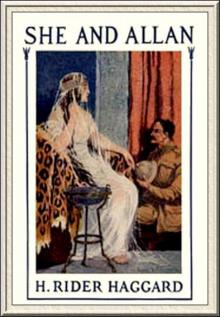 She and Allan
She and Allan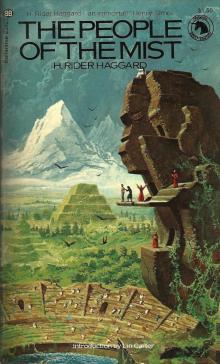 The People of the Mist
The People of the Mist She
She Morning Star
Morning Star King Solomon's Mines
King Solomon's Mines She: A History of Adventure
She: A History of Adventure Cleopatra
Cleopatra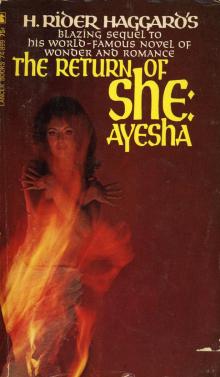 Ayesha, the Return of She
Ayesha, the Return of She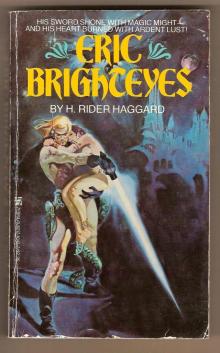 Eric Brighteyes
Eric Brighteyes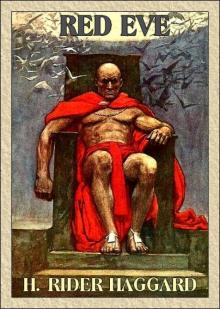 Red Eve
Red Eve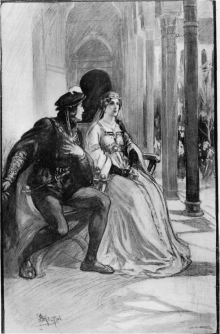 Fair Margaret
Fair Margaret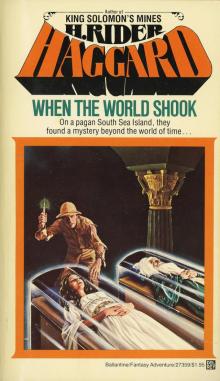 When the World Shook
When the World Shook Lysbeth, a Tale of the Dutch
Lysbeth, a Tale of the Dutch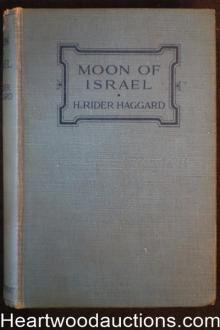 Moon of Israel: A Tale of the Exodus
Moon of Israel: A Tale of the Exodus Long Odds
Long Odds The Ghost Kings
The Ghost Kings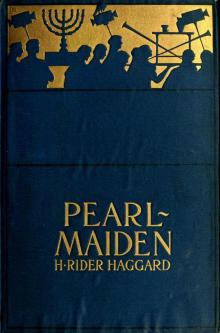 Pearl-Maiden: A Tale of the Fall of Jerusalem
Pearl-Maiden: A Tale of the Fall of Jerusalem Allan and the Holy Flower
Allan and the Holy Flower Smith and the Pharaohs, and other Tales
Smith and the Pharaohs, and other Tales The Wanderer's Necklace
The Wanderer's Necklace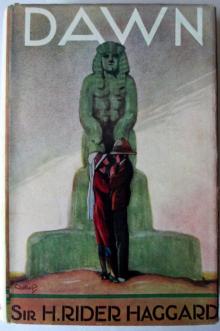 Dawn
Dawn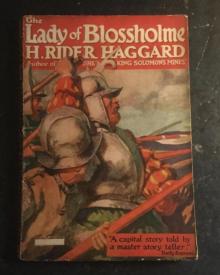 The Lady of Blossholme
The Lady of Blossholme Stella Fregelius: A Tale of Three Destinies
Stella Fregelius: A Tale of Three Destinies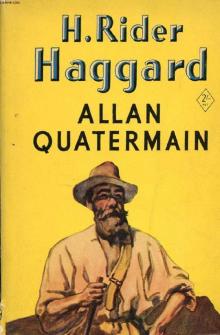 Allan Quatermain
Allan Quatermain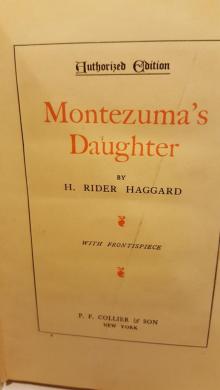 Montezuma's Daughter
Montezuma's Daughter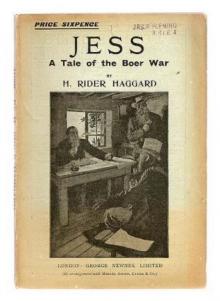 Jess
Jess The Brethren
The Brethren Allan's Wife
Allan's Wife Child of Storm
Child of Storm Queen Sheba's Ring
Queen Sheba's Ring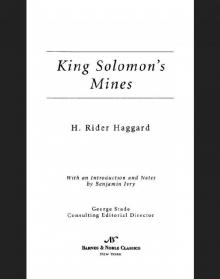 King Solomon's Mines (Barnes & Noble Classics Series)
King Solomon's Mines (Barnes & Noble Classics Series)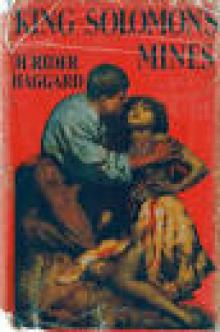 Complete Allan Quatermain Omnibus - Volumes 1 - 10
Complete Allan Quatermain Omnibus - Volumes 1 - 10